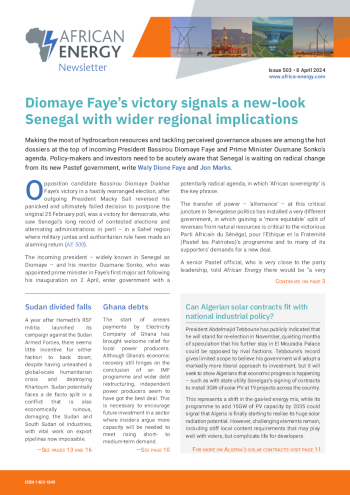

The issue leads with Senegal, where making the most of hydrocarbon resources and tackling perceived governance abuses are among the hot dossiers at the top of incoming President Bassirou Diomaye Faye and Prime Minister Ousmane Sonko’s agenda. Policy-makers and investors need to be acutely aware that Senegal is waiting on radical change from its new Pastef government, write Waly Dione Faye and Jon Marks.
African Energy also takes a closer look at Benin, where a proposal to add 300MW of solar PV would reshape the power sector if implemented. Analysis of the African Energy Live Data platform suggests a more incremental approach will be necessary given Benin’s rocky record of project implementation, alternative GTP ambitions and the sheer size of what is proposed compared to operating capacity.
Power coverage includes a focus on Algeria, where the planned addition of 3GW of solar power over the next two years will be the first substantial shift in Algeria’s gas-dependent energy mix in decades – and is intended as the first step in a programme to add 15GW of solar capacity by 2035. The government’s track record, however, raises significant doubts about whether the new vision is achievable.
African Energy also takes a closer look at Ghana, where the start of arrears payments by Electricity Company of Ghana has brought welcome relief for local power producers. Although Ghana’s economic recovery still hinges on the conclusion of an IMF programme and wider debt restructuring, private investors have been able to win better terms for their power projects.
Upstream coverage includes analysis of Mauritania’s $1bn deal with an Egyptian consortium to develop offshore gas.
African Energy’s downstream coverage and African Energy View focus on the Sudan civil war. A year after Hemedti’s RSF militia launched its campaign against the Sudan Armed Forces, there seems little incentive for either faction to back down, despite having unleashed a global-scale humanitarian crisis and destroying Khartoum. Sudan potentially faces a de facto split in a conflict that is also economically ruinous, damaging the Sudan and South Sudan oil industries, with vital work on export pipelines now impossible.
Subscribe to African Energy